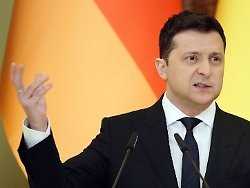Scholz in Kiev
Selenskyj is annoyed at times
By Denis Trubetskoy, Kiev
2/14/2022, 7:44 p.m
Chancellor Scholz’s visit is seen as an important signal in Kiev at a time when Russian troops are deploying. However, it is also clear how different the positions are.
While the Federal Foreign Office advises against traveling to Ukraine, the Embassy in Kiev is reducing its staff and the German Consulate General is moving to western Ukraine, Chancellor Olaf Scholz has gone the opposite way. He traveled to Kiev on Monday – a day before he was received by Russian President Vladimir Putin in Moscow. Actually, that could have been an important signal in these tense times.
Ukrainian President Volodymyr Zelenskyy thanked Scholz for this sign of solidarity. But in reality, from the Ukrainian point of view, the Chancellor’s first visit to Ukraine was not a great success. Breakthroughs were hardly to be expected anyway, after French President Emmanuel Macron had not achieved much in Kiev and Moscow last week and the Berlin meeting of political advisers as part of the so-called Normandy format had failed.
Nevertheless, Zelenskyj was visibly annoyed at the Marienpalast in Kiev – and not just because of the German government’s renewed cancellation of arms deliveries. Official Kiev has largely come to terms with this.
What was striking was Zelenskyj’s statement that he also did not know what specific sanctions the western allies would impose against Russia in the event of a Russian invasion. The Chancellor did not answer this question. He hadn’t received an answer from other Western heads of government either, so unfortunately he couldn’t say anything about it, Zelenskyj explained quite bluntly.
Selenskyj also has a topic on which he says nothing
The Ukrainian Foreign Ministry always assures that it is in close contact with its partners on this topic. Zelenskyy also said very clearly that there are differences in the assessment of Nord Stream 2: Ukraine regards the Baltic Sea pipeline as a “geopolitical weapon”. The fact that Scholz did not mention the name of the gas pipeline in Kiev may have bothered the president.
What also came as a surprise from a Kiev point of view at the press conference was the Chancellor’s assurances that Zelenskyy had promised him that he would submit draft laws to which Ukraine had committed itself as part of the Minsk peace process. Specifically, Scholz addressed the fact that Ukraine wanted to grant the contested eastern Ukrainian regions of Luhansk and Donetsk an autonomy statute in their constitution. The Ukrainian President left this statement uncommented.
There is reason to doubt that Selenskyj shares the viewpoint described by Scholz. It is precisely because of such questions that the meeting in the Normandy format recently failed. So that negotiations could be resumed, at least at the level of political advisers, the Ukrainian government withdrew a draft law on the so-called reintegration of the occupied territories, which not only contradicted the Minsk Agreement but also had several weaknesses. In general, Ukraine follows the principle that the agreement can only be implemented after all security issues have been clarified. Russia, on the other hand, is committed to doing both at the same time.
When there is actually pressure behind praise
For Ukraine, the issue of the special status of Donetsk and Luhansk is also sensitive because the government in Kiev currently does not control these areas and Russia diligently issues Russian passports there. In addition, the Russian State Duma will vote this Tuesday on an appeal to Putin to consider recognizing the two “People’s Republics”.
One felt “that both Selenskyj and Scholz are nervous – because of their foreign policy inexperience, both said things that one should rather not have said,” said Ukrainian political scientist Lyudmyla Subryzka from the Kiev Mohyla Academy in an interview with ntv. en. Specifically, Subryzka referred to Scholz’s statement that Ukraine’s NATO membership is not currently on the agenda. While this is not a new position in principle, Zelenskyy’s emotional reaction showed that he had struck a chord.
The visit of the German Chancellor to Kiev showed once again “that Ukraine’s European partners are putting pressure on Kiev to make significant concessions in fulfilling the Minsk Agreement,” Subryzka continued. “Berlin really wants Ukraine to show Moscow that they are doing something, too.” In fact, Scholz praised that it was good that Ukraine was presenting the relevant draft legislation. This contributes to “that there can be no excuses to get out of the now muddled situation with the necessary strategy”.
All in all, the political scientist’s verdict is skeptical: “The visit doesn’t seem to have been particularly successful,” said Subryzka. “But it remains to be seen how the Chancellor’s meeting with Putin will go tomorrow.” Only then can one really assess the new diplomatic round.
